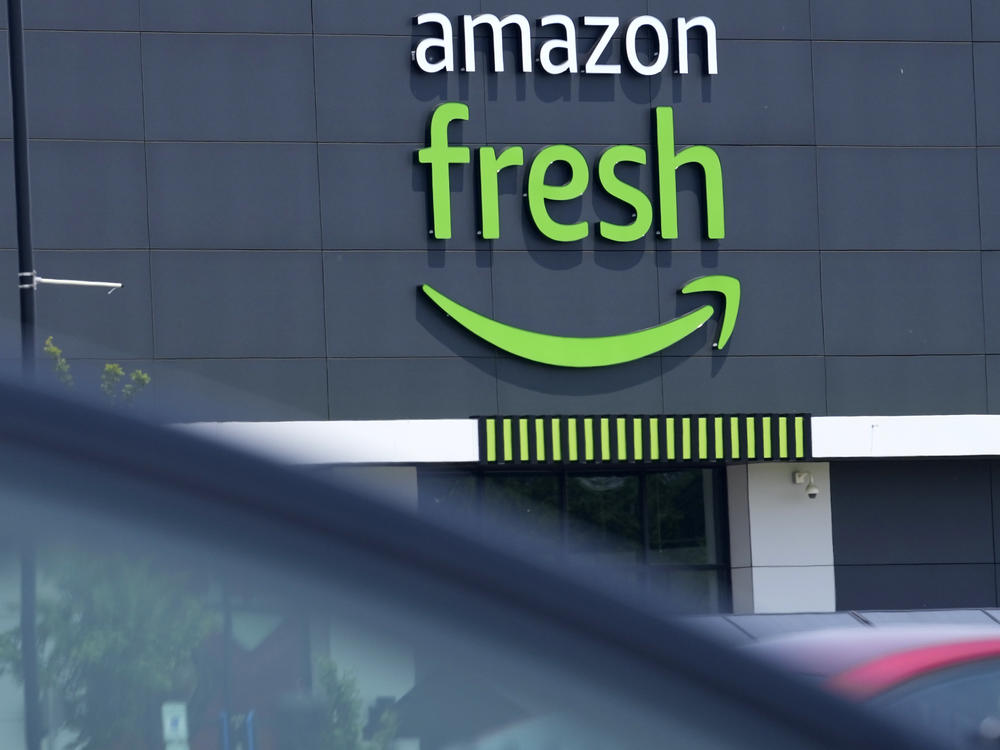Section Branding
Header Content
Amazon may have met its match in the grocery aisles
Primary Content
On a recent Friday afternoon, Amy Luu used her Prime account to scan into an Amazon Fresh grocery store in Washington, D.C. She walked through an automated gate, grabbed one avocado and left — without checking out at a register. Cameras in the store monitored what she took; Amazon sent her a receipt shortly afterward.
It was convenient, but Luu rarely shops at Amazon Fresh even though she lives only two blocks away. She said she prefers to get her groceries at the nearby farmers market and Safeway.
"I came in because I was lazy, but typically I don't come into Amazon," Luu said. "I don't really like the system. It's a lot of oversight."
Amazon laid off workers at its brick-and-mortar grocery stores last week — the latest sign of the e-commerce giant's struggles to stand out in the competitive grocery landscape.
"Grocery is truly the final frontier for Amazon in terms of untapped growth," said Jordan Berke, CEO of Tomorrow Retail Consulting. "This is the largest retail category that Amazon has struggled to compete in."
Amazon's bet on automated shopping
Technology is a key component of Amazon's grocery challenges. Karan Girotra, a professor at Cornell Tech, said the Amazon Fresh job cuts underscore Amazon's failure to lure in shoppers and secure a competitive edge through its automated shopping experience.
Arun Sundaram, a research analyst at CFRA Research, said Amazon is currently "another regular grocery retailer amid all the other grocery retailers out there."
Regarding the recent layoffs, Amazon spokesperson Jessica Martin said Amazon is assessing the Fresh stores' "organizational needs." Martin declined to share how many employees were affected, though The Washington Post reported that hundreds of workers lost their jobs.
More than half of Amazon Fresh stores in the U.S. use what the company dubs Just Walk Out technology. Shoppers can avoid checkout altogether; cameras in the stores detect what they grab, and they're sent a receipt after they leave.
Amazon also operates over 20 cashier-less convenience stores called Amazon Go.
The first Fresh store opened in 2020. Girotra said automating the shopping process hasn't yielded the results Amazon was envisioning when it launched the Fresh chain.
"When Amazon entered this business, their assumption was they could use technology to compensate for their late entry, for their lack of scale and lack of a large physical network," Girotra said. "The hope was technology would give them an edge, but it didn't really happen."
Apparently, many shoppers haven't bought into the futuristic grocery experience. Foot traffic data analyzed by Bloomberg Intelligence shows customers shop at nearby competitors far more frequently than they do at Amazon Fresh locations.
Jennifer Bartashus, a senior retail-staples analyst at Bloomberg Intelligence, said Amazon may have hired too many workers to staff its Fresh stores, given the relatively limited traffic that the stores are receiving.
But Martin, the Amazon spokesperson, said the company is still committed to grocery "because we believe when we find the right mix of offerings for customers we'll be able to make their lives even easier."
Amazon announced on Wednesday it will start offering grocery delivery from Fresh stores to customers who are not Prime members – yet another attempt to reach more shoppers. This delivery option is now available in a dozen U.S. cities, with further expansions planned, according to Amazon Fresh vice president Claire Peters.
The Fresh job cuts, which affect lower-level management employees at many of the company's 44 Amazon Fresh locations in the U.S., come just months after Amazon started scaling back its overall retail operations. CEO Andy Jassy said on an earnings call in February that the company won't open new Fresh stores until it reevaluates its grocery model.
Since late last year, Amazon has laid off about 27,000 employees across its divisions in an effort to curtail costs.
Investors are skeptical
On the February earnings call, Jassy said Amazon is "doing a fair bit of experimentation" in its Fresh stores, but it remains committed to its grocery business.
"We're working hard at it. We see some encouraging signs," Jassy said on the call. "And when we do find that equation, we will expand it more expansively. But I do think that we have a very significant opportunity in the grocery segment."
On Amazon's next earnings call, scheduled for this Thursday, Berke said he expects Jassy to reiterate that the company is still in "pause mode"
"The investor community is really skeptical, at this point, that the current strategy can scale," Berke said.
The grocery industry is saturated with big-name brands, and it's a low-margin business. Sundaram said this means any new player needs to have a unique quality to attract and retain shoppers.
Competition in the mass-market sector
Amazon acquired Whole Foods Market in 2017 for $13.7 billion — a segment of Amazon's grocery business that experts say has served the company well, thanks to its position as a top specialty retailer.
Bartashus said Amazon did benefit from a "transfer of knowledge" about the grocery sector through the Whole Foods acquisition. But in 2022, Whole Foods held less than 2% of grocery market share, according to data from Chain Store Guide.
With the subsequent launch of its Fresh stores, Amazon has been looking for inroads into the mass-merchandise segment of the grocery business in order to draw in shoppers who might typically frequent major grocery chains like Kroger or Walmart.
But Sundaram said breaking into the mass-merchandise business is a challenge, given the competition.
"They haven't really found a concept for these stores that truly resonates with the consumer and a store that also makes sense from a profitability, economic standpoint," Sundaram said.
Editor's note: Amazon is among NPR's financial supporters.
Copyright 2023 NPR. To see more, visit https://www.npr.org.

